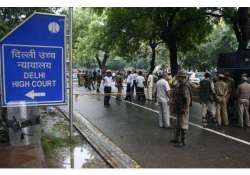Once National Herald publication started, how is re-entry notice justified: Delhi HC asks Centre
Solicitor General (SG) Tushar Mehta, appearing for the ministry and the Land and Development Office (L&DO), told the court that re-entry notice was issued as it had initiated the proceedings back in 2016 when no printing or publishing activity was going on.

What is the justification to re-enter the premises now when publication of National Herald has commenced, the Delhi High Court asked the Centre on Thursday.
Justice Sunil Gaur, who reserved his verdict in the matter, asked the Urban Development Ministry, “They are now running the newspaper. So where is the justification now to re-enter premises? Where is the occasion now to re-enter the premises?”
Solicitor General (SG) Tushar Mehta, appearing for the ministry and the Land and Development Office (L&DO), told the court that re-entry notice was issued as it had initiated the proceedings back in 2016 when no printing or publishing activity was going on.
All the procedures have been followed to the hilt before issuing the notice for re-entry to AJL, Mehta said.
“Procedure may have been followed, but by the time re-entry notice was issued, they were running a newspaper,” the court said.
Senior advocate Abhishek M Singhvi, appearing for AJL, opposed the SG’s argument saying that publication of web editions began in 2016 and the issue of absence of printing press in the premises was not raised then.
He said the government kept silent till April 2018 when it again sent a notice for inspection and in which it had said that it was coming to check breaches mentioned in notice of October 10, 2016.
Singhvi also argued that several major papers carry out printing elsewhere.
To this the SG said that for web editions “only a laptop is required and not a five-storey building in the heart of the city”.
After hearing arguments of both sides, the court reserved its verdict on AJL’s plea challenging a October 30 order of the ministry, ending its 56-year-old lease and asking it to vacate the premises at the press enclave in ITO here.
The judge while reserving judgement also said that the government cannot straightaway throw out AJL without first proceeding under the Public Premises (Eviction of Unauthorized Occupants) Act, 1971.
The court had earlier asked the government to maintain status quo with regard to enforcement of the October 30 order.
The SG, during arguments, also contended that transfer of 98 per cent stake in AJL to Young Indian (YI) when the latter bought the former’s Rs 90 crore debt for a consideration of Rs 50 lakh, led to a “virtual” sale of the Herald building.
“Come to your rules and regulations. Where is the bar (on transfer of shares)? Where have you prohibited transfer of shares? Where does transfer of shares lead to sale of property? How does it amount to a sale,” the court asked.
To this, the SG replied that transfer of shares leading to a virtual sale of the property or change in ownership, “can be seen by lifting the corporate veil”.
This contention was opposed by Singhvi, who argued that there was no clause in the lease agreement prohibiting share transfer.
He also said that YI was a non-profit company and no benefit has gone to it from being a share holder of AJL.
The senior lawyer further said that transfer of shares has not led to change in ownership or sale of the property.
Regarding the SG’s argument that there was no printing going on in the premises, for which building was given on concession, Singhvi said it was a “fallacious and weird” contention which ignored the change in technology over the years.
He said that with change in technology, it was “discriminatory” to insist on having a printing press.
Singhvi further said that “special affection” was being shown to AJL by the government as there were several newspapers, including two national dailies, which carry on printing activity from a separate location.
To this, the SG said the other papers have a better circulation than National Herald.
Singhvi replied that circulation cannot be a ground for eviction and it was not a reason given in the re-entry notice.
In its petition, the AJL has alleged that the proceedings by the ministry were being initiated for the purposes of “scuttling the voices of dissent” and the voice of the largest opposition party in the country, a reference to the Congress.
Without naming the BJP, the AJL has further alleged that the order issued under pressure and directives from the ruling party at the Centre is vitiated by mala fide, bias and had “oblique political motives”.
The L&DO, which comes under the ministry, had ended the lease—entered into with AJL on August 2, 1962 and made perpetual on January 10, 1967 -- asking the company to hand over the possession by November 15.
The L&DO’s order also said that failure to hand over possession would lead to initiation of proceedings under the Public Premises Act.
In its plea, AJL has also said that the digital versions of English newspaper National Herald, Hindi’s Navjivan and Urdu’s Qaumi Awaz have commenced since 2016-17.
The weekly newspaper National Herald on Sunday resumed on September 24 last year and the place of publication was the ITO premises, Singhvi said, adding that the Hindi weekly newspaper Sunday Navjivan was also being published since October this year from the same premises.